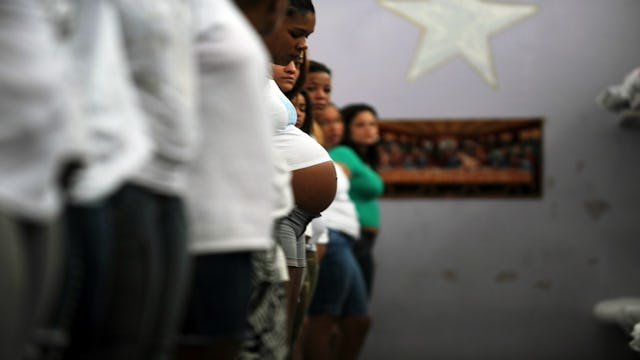Too Many Moms Are Stuck In Jail For Non-Violent Crimes

Being a parent is hard. There’s no doubt about that. Now imagine becoming a mother while behind bars — or being a child brought into the world while your mother is incarcerated. This is happening to many women — oftentimes without conviction and before trial.
The reason? The cost of bail.
An article in Upworthy recently told the story of Theresa, who was nine months’ pregnant with her third child when she was arrested. She gave birth in jail, no family allowed to be near her. Moments after the birth, the child was taken by the Department of Child Safety. This was the beginning of a long struggle with child protective services to get her child back.
According to the Prison Policy Initiative, 219,000 women were incarcerated in 2017, and while it’s difficult to find current data on how many of those women are pregnant, in 2004, a Bureau of Justice Statistics survey found that 3% of women in federal prisons and 4% of those in state prisons were pregnant upon arrival. If those percentages were projected out to the 2017 population, it would mean that roughly 6,500 incarcerated women are pregnant.
As a father of three whose own father spent time in jail, I can say I find these statistics staggering. And you should too. Unfortunately, visiting my father in the Utah County Jail are some of the most vivid memories of my childhood, and not because they were rewarding in the way father-son interactions ought to be. They were memorable and unfortunate, and I often worried that I wouldn’t be able to break the chain and would eventually end up on the other side of the glass, in the same situation as my father.
Even more shocking is that many of the pregnant women behind bars are there for non-violent crimes. And many births in jail could be avoided if the mother could afford bail. Looking back at Theresa, she was eventually bailed out just before Mother’s Day. Theresa’s friend crowd-funded bail money as part of an initiative in collaboration with the American Civil Liberties Union (ACLU) and Black Mama’s Bail Out, whose focus is trying to figure out ways to help mothers get out of jail.
But let’s take a step back and look at the reality of the situation. Theresa was not convicted of a crime. She had yet to go to trial, but because of her financial situation, she had to give birth in jail. All of this makes it obvious that our current criminal justice system discriminates against low-income mothers.
Things get even more complicated when we look deeper at what it means to give birth in a prison. We talk a lot about giving children a good start in life, and coming into this world with your mother incarcerated sounds like a good reason to double down on that child, and give them more rather than less. But the sad fact is, most children being born to incarcerated women in the U.S. are getting the opposite in both medical care and after birth support.
In “Pregnant and Behind Bars: how the US prison system abuses mothers-to-be,” Victoria Law discussed the poor treatment of incarcerated pregnant women. She describes women giving birth on filthy, bloodstained mattresses. She tells of women receiving no prenatal care, guards refusing to believe women were in labor even after their water broke, and one women giving birth while her feet and hands were shackled. Women tell stories of being malnourished while pregnant, or how when they were given additional food, it was often expired.
The article is a tough read, particularly for anyone who knows the struggle and uncertainty that comes with bringing a child into the world. Incarcerated pregnant women shouldn’t be forced to forego basic human rights, nor should their unborn child be forced to suffer due to a lack medical attention or parenting education.
Will Gaona, policy director for the ACLU of Arizona told Upworthy, “Even spending a few days in jail has a profound impact on people’s lives. Especially for those with low incomes, they’re likely to lose their jobs, they may lose their housing, they’re in danger of losing custody of their children.”
Things become even more unfortunate when you consider that mothers who cannot afford bail are more likely to take a plea deal even if they are not guilty of the crime. A study by the New York City Criminal Justice Agency found that conviction rates skyrocketed from 50% to 92% for individuals who are jailed pre-trial and cannot afford to pay their way out.
So what can be done? Naturally, that’s a huge question. Donating to the Black Mama’s Bail Out is a good first step. With the support of the ACLU, every donation goes to helping get a mother out of jail, and to raising awareness for this issue. And once each case is finished, the bail money goes back to the organization to help another mother.
Another way to help is to push to raise the standards for pregnant women in jail. For instance, the Montana Women’s Prison Parenting Program provides parenting classes, support groups, community resource information and identification, mother-child visits, and a monthly Kids’ Day event for mothers incarcerated in the Montana Women’s Prison in Billings.
The reality is that incarcerated mothers and their children deserve better treatment. There is no reason mothers should be subjected to a lack of medical care, whether they are incarcerated or not.
This article was originally published on